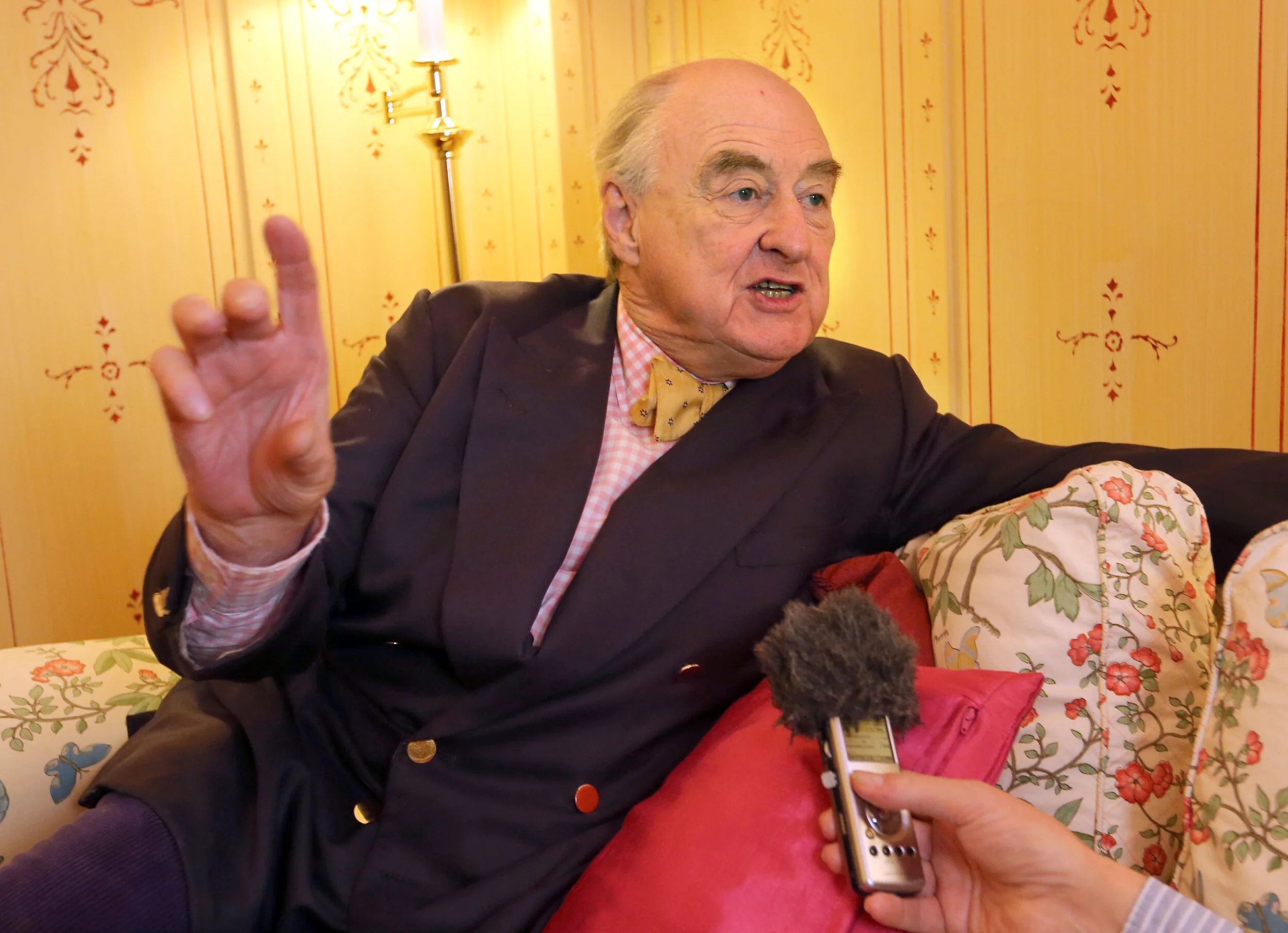Day With Test Match Special
These two phots of Henry Blofeld taken by Richard Austin remind me of a day I spent at Edgbaston watching cricket with the BBC Test Match Special team.
Many years later I interviewed Henry at a hotel in Taunton where he was doing a talk - and I am desperately looking for the recording I made that day because, as usual, Mr Blofeld was highly amusing. But in the meantime, here the report I write for the newspaper immediately after my day in the commentary box many years ago…
Me interviewing Henry Blofeld at the Castle Hotel in Taunton
It wafts across gardens and allotments, it drones in tractor cabs and cars, it echoes in artists’ studios and squeaks in tiny hidden headphones worn by men supposed to be at work. It is more quintessentially English than a cucumber sandwich at a vicar’s tea-party – it reeks of genteel shires more than any old fashioned rose… It is, indeed, the sound - the clarion call - of this nation’s summer.
Three letters sum up this audible kingdom: TMS. Test Match Special. Once I loathed it. I used to ask: “How dare the men of cricket hijack my beloved Radio 4?” But that was before I succumbed to its cheerful companionship. Now I am addicted.
There’s something reassuring about the day-long, ball-by-ball coverage that is broadcast by the BBC. Something matey and endearing about Blowers chuckling and twittering on about a pigeon. Something sublimely comforting about the occasional, unmistakable, thwack of leather upon willow.
You don’t even have to be interested in cricket to enjoy TMS. While the rest of Radio 4 obsesses about women’s illness, world events and consumer affairs, the cricket is a mesmerising experience that can induce hours of reverie.
So, when I was recently invited to one of the high-altars of sports broadcasting – the TMS commentary box at Nottingham’s Trent Bridge – I jumped at the chance. Would the faces behind the voices match my expectations? Would Aggers, Blowers and CMJ be quite as charming off-mic’? Would there be cakes?
England were going about the business of gaining their third Test victory over New Zealand, and before I reached the ground I could hear the men from the BBC were in fine voice.
The commentary box is situated high in the new Radcliffe Road stand and I had to pass several security checks in order to reach the hallowed eyrie.
My first impression was of a library in a gentleman’s club. At the rear of the box three men, surrounded by books, were working with an intensity I hadn’t expected, given the programme’s jocular approach.
The BBC’s cricket correspondent Jonathon Agnew, seemed to be straining at a laptop, while veteran commentator Henry Blofeld referred to Wisden after Wisden.
I’d seen ‘Aggers’ on TV before, but I instantly recognised ‘Blowers’ thanks to his immaculate, rather up-market form of dress. Henry is highly critical of the sartorial eccentricities of others, but his own gear is not exactly low key. On this particular day a chequered blazer was set off by a rakish silk cravat.
He has, arguably, the best known voice in British broadcasting. It has the sort of velvet texture that could be produced by a mouthful of port and Stilton – and there is a definite hint of plum too. Blowers employed the voice in hushed tones to welcome me, and moved some books from a chair so I could sit down.
The third student in the library was ex-England cricketer Angus Fraser. His giant frame was hunched over yet more books and he seemed lost in a world of his own.
Between us strode a man. Producer Peter Baxter paced up and down like one of those big cats you used to see at zoos where the cages were too small. Up and down he went, constantly glancing at the sheaves of schedules that were attached to a clipboard. Mr Baxter nodded to me in a friendly way, and then continued his endless procession. He paced between the commentators and a table laden with the legendary cakes which female listeners delight in sending to the team.
And there, at the front, by the open window – were the men in the hot seats. Christopher Martin-Jenkins, better known as CMJ, was doing most of the talking. He didn’t look in the least bit like I’d imagined – he is tall and noticeably slight. CMJ invariably speaks with the mannered calm of an airline pilot about land. Much is understated and all is dry.
On his left sat the best known cricket scorer in the world. Bill Frindall, ‘Bearders’ as he’s sometimes known, had yet more books - some open, some shut. His corner could have been renamed Wisden World. He was also using a computer upon which he kept score.
And to CMJ’s right was a fellow Westcountryman. Vic Marks is chairman of cricket for the Somerset county team. He seemed to eye me with some suspicion. Several times I noticed him looking across. And then came a moment I shall never forget.
When ‘Gus Fraser took over the summariser’s seat, Victor came over and asked which newspaper I was from. When I told him he said: “You’re Martin Hesp. I read your stuff. Get the Morning News everyday.”
Talk about chuffed. That a man from TMS should know the likes of lowly me… But it got better. Victor sat down and we began a long chat that covered just about anything and everything. I was rather surprised no one ticked us off for making such a noise, but was too full of a sense of self-congratulation to care.
Aggers put down his laptop and joined our conversation and then Blowers slammed shut a Wisden and told me something of his many years at the microphone.
Suddenly I was bathing in the warm and relaxed sense of friendship for which the TMS team are renowned.
Blowers was saying: “I started this lark in 1972. Can you believe it? But Bill has been here longer – he started in 1966. Why do I go on about pigeons? Oh, I love ornithology. I saw a heron only yesterday, and a kestrel. At least, I think it was a kestrel.”
I asked Jonathan Agnew what he’d been doing on his laptop. “Emails,” he groaned. And then he asked me how long it had taken to drive from Exmoor. He seemed deeply interested to know why I was up for the Test. Was it so I could grill Vic Marks on Somerset’s recent bad form, he asked.
By now Henry was at the mic’ babbling on about helicopters and old fashioned aeroplanes, but soon it was Aggers’ turn and he left Victor and I to carry on chatting.
I asked the Somerset man how he’d made the transfer from playing cricket to commentating. “It was in the West Indies,” he replied. “I was 13th man and wasn’t likely to get a knock, and something went wrong with one of the TMS summarisers. Delhi-belly or something. Anyway, they asked me if I could give it a go, and I did.
“I don’t think it was a rip-roaring success,” he mused, humbly. “But suppose I must have done something right because they’ve been asking me back ever since.”
At this point we could hear Jonathon Agnew telling the cricket listening world something about there being a West Country journalist in the commentary box. I think he referred to the WMN as the Western Morning Gazette – and he said something like: “I don’t know what’s going on in the back of the box, but Victor Marks is being grilled by a West Country reporter who wants to know why Somerset are doing so badly.”
Victor tried to correct him about the name of the paper, but by then it was too late. Someone far below was bowling and the all-important cricket once again took centre-stage. My moment of fame was brief and very vague – and it was over.
But it was a visit I shall never forget. Every time I’m lazing in my deckchair listening to the sound of summer, I shall recall the warm and friendly atmosphere of its Wisden-laden source.
TMS STORY
Test Match Special hit the airwaves in 1957 when the BBC became the first broadcaster to cover every ball of a Test match. The slogan for the programme in the Radio Times was: “Don't miss a ball, we broadcast them all.”
They still do, but now on Radio 4 198 long-wave rather than on Radio 3 where TMS spent 30 years.
John Arlott was one of the programme’s most celebrated presenters. Bill Frindall remembers the day he met the great man. “He said: ‘I hear you like driving. Well, I like drinking - we're going to get on well!’ So I was John Arlott's chauffeur for 15 years. He was marvellous.”
Blowers will never forget the famous moment when pent up laughter dominated the airwaves for minutes on end. “I suppose my classic memory was at the Oval in 1976 when England were doing better than usual - they were 81 for seven I think. Brian (Johnstone) suddenly announced to an unsuspecting world: ‘Well, I can tell you the bowler’s Holding the batsman’s Willey.”
The resulting hilarity has gone down in broadcasting history and has featured on Radio 4’s other perennial favourite, Desert Island Discs, several times.





